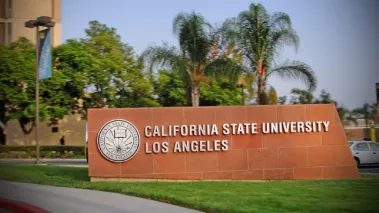Table of Contents
CSU Los Angeles Reforms ‘Controversial’ Speaker Fee Policy Following Lawsuit

(By Justefrain/CC BY-SA 3.0, modified from original.)
In February, conservative author and political commentator Ben Shapiro spoke at California State University, Los Angeles (CSULA), despite efforts by CSULA President William Covino—joined by some faculty members and students—to prevent him from speaking. In May, Shapiro and the event’s sponsor, the Young America’s Foundation (YAF), filed a lawsuit against CSULA, Covino, and several administrators on First Amendment grounds.
Last week, CSULA sought to dismiss the lawsuit on the basis that they’ve now abandoned their policy requiring students (or visiting speakers) to pay for security guards whenever a “controversial” speaker comes to campus. Unfortunately, CSULA’s new policy would still permit administrators to impose these very same fees whenever they felt a speaker might receive a hostile reaction.
When Shapiro was invited by students to bring his “When Diversity Becomes a Problem” speech to CSULA, university administrators initially attempted to require Shapiro and YAF to pay over $600 in security fees. This demand was based on policies allowing administrators to require—and charge for—the presence of police officers and student assistants for any “Controversial activity.”
When a public university like CSULA requires the presence of security guards at a speaking event, it cannot base its determination on what the speaker will say and how others will respond to it. Doing so not only imposes fees because of the identity of the speaker and the content of his or her speech, but creates a perverse incentive for disruption. Those opposed to a particular speaker’s view need only threaten protests or a violent reaction to be rewarded by the government imposing the costs of their reaction on their ideological opponents, potentially making it difficult (if not cost-prohibitive) to bring the speaker to campus. As UCLA Law Professor Eugene Volokh has noted, “Behavior that gets rewarded gets repeated.”
Security fees are, in short, an enforcement mechanism for the heckler’s veto. That’s why viewpoint-based security fees—a tax on offensive speech—are unconstitutional. In Forsyth County v. Nationalist Movement (1992), the U.S. Supreme Court made it abundantly clear that “[l]isteners’ reaction to speech is not a content-neutral basis for regulation. ... Speech cannot be financially burdened, any more than it can be punished or banned, simply because it might offend a hostile mob.”
Shapiro and YAF, fortunately, had ready access to lawyers who could point out the unconstitutional nature of these fees, and CSULA dropped its demand. Other students seeking to bring in controversial speakers, however, may not be able to afford attorneys to explain, as YAF did, why the fees are unconstitutional.
CSULA’s new policy was adopted on June 29, just shy of two weeks before the university asked the court to dismiss Shapiro’s lawsuit. The new policy removes the explicit ability to charge for the presence of officers for any “controversial” event, but instead allows CSULA to perform a “risk assessment” of events, considering the “type of event, profile of attendees, historical, or any other relevant considerations” on a “case-by-case basis."
The policy is an improvement, but it doesn’t bring CSULA into compliance with the First Amendment. Instead, CSULA has traded one problem—viewpoint-based security fees—for another: granting nearly unbridled discretion to administrators to decide whether to charge those same fees.
The First Amendment does not permit colleges to grant carte blanche power to administrators to make decisions about whether to charge fees, including security fees, without objective, published criteria to guide those decisions. In the absence of such clear, viewpoint-neutral criteria, there is an unacceptable risk that administrators will let their own opinions of the speaker’s views determine whether to charge those fees.
CSULA’s new policy provides no objective criteria. Instead, CSULA will subjectively weigh the “type of event,” “historical” considerations, and “other relevant considerations” in determining whether—and how much—to charge students to bring a speaker to campus. So, if a speaker’s appearance has sparked protests at other campuses, or at CSULA, then administrators can impose security fees. Similarly, what “type of event” means is left for administrators to divine. And the “other relevant considerations” catch-all category allows an administrator to consider whatever they subjectively feel is relevant—including whether the speaker’s appearance will be controversial, or whether they disagree with his or her message.
So while CSULA appears to be trying to escape a court’s judgment, they don’t yet seem to be willing to implement a policy that affirms their commitment to freedom of speech.
Here's CSULA's new policy:
Recent Articles
Get the latest free speech news and analysis from FIRE.

Wide-ranging coalition of 'friends of the court' continue to support citizen journalist Priscilla Villarreal in her return to the Supreme Court

How America’s top tribal arts college silenced a student — and made him homeless

Why FIRE is suing Secretary of State Rubio — and what our critics get wrong about noncitizens’ rights
